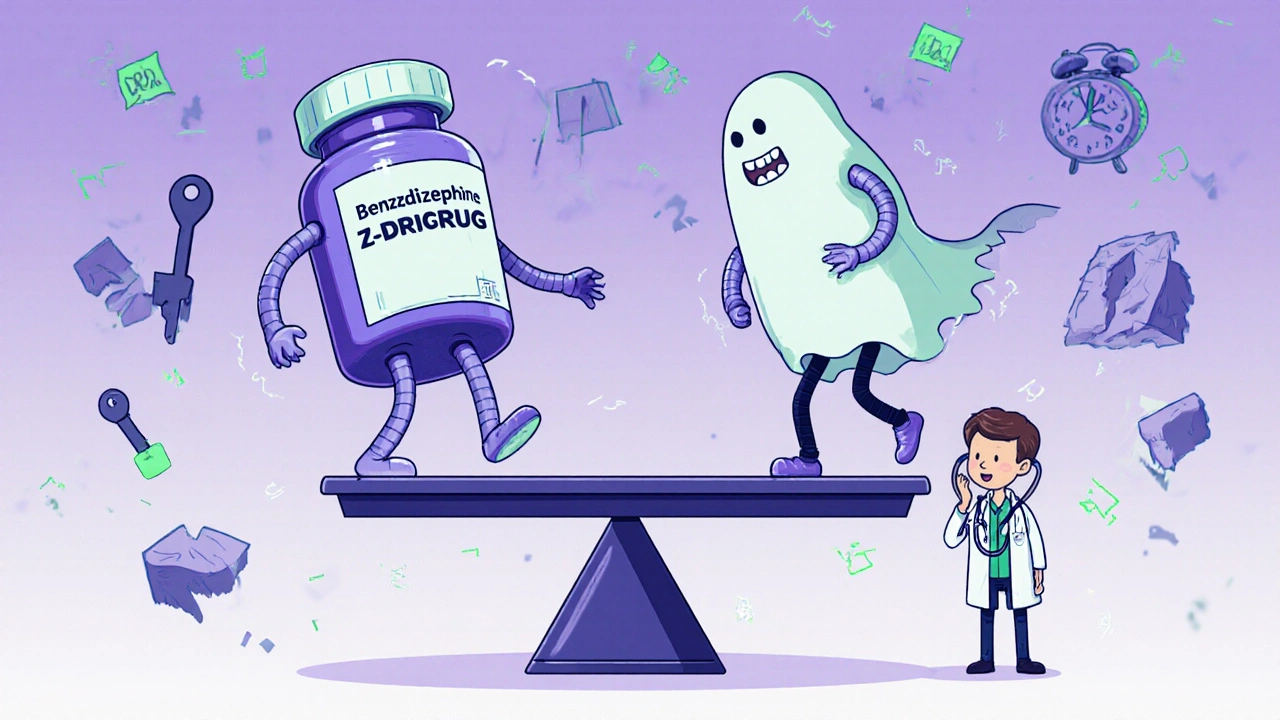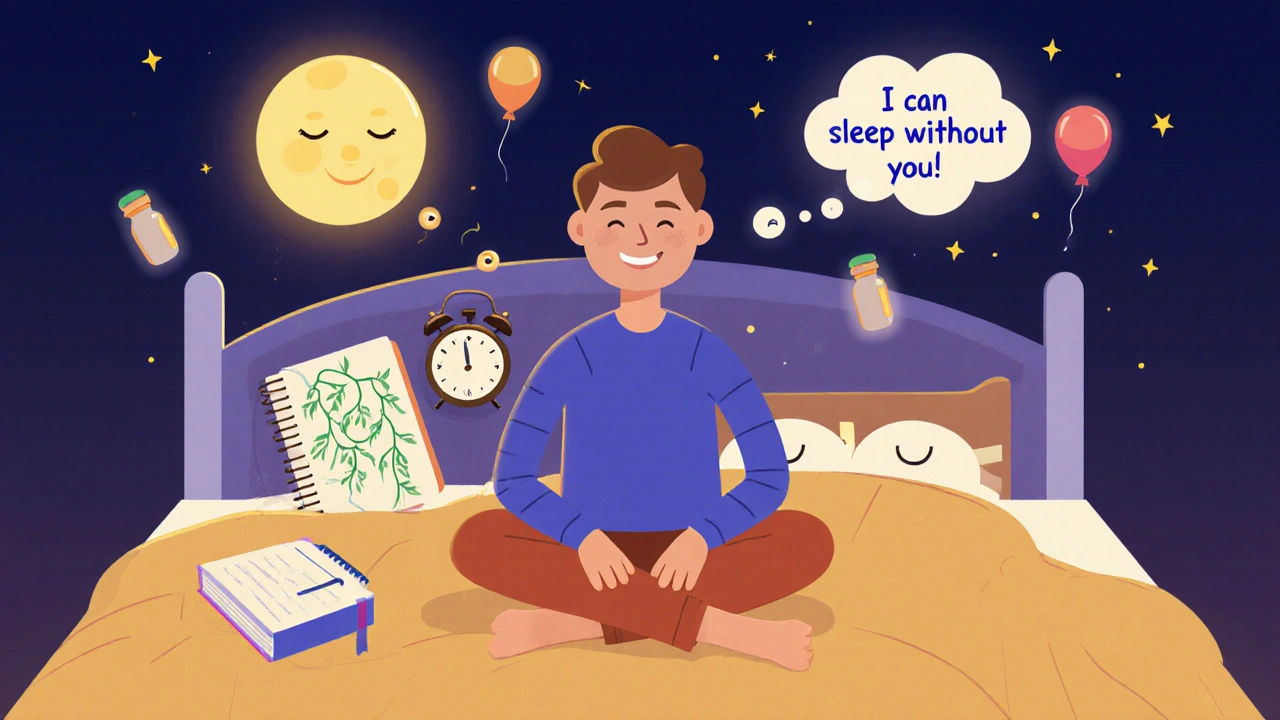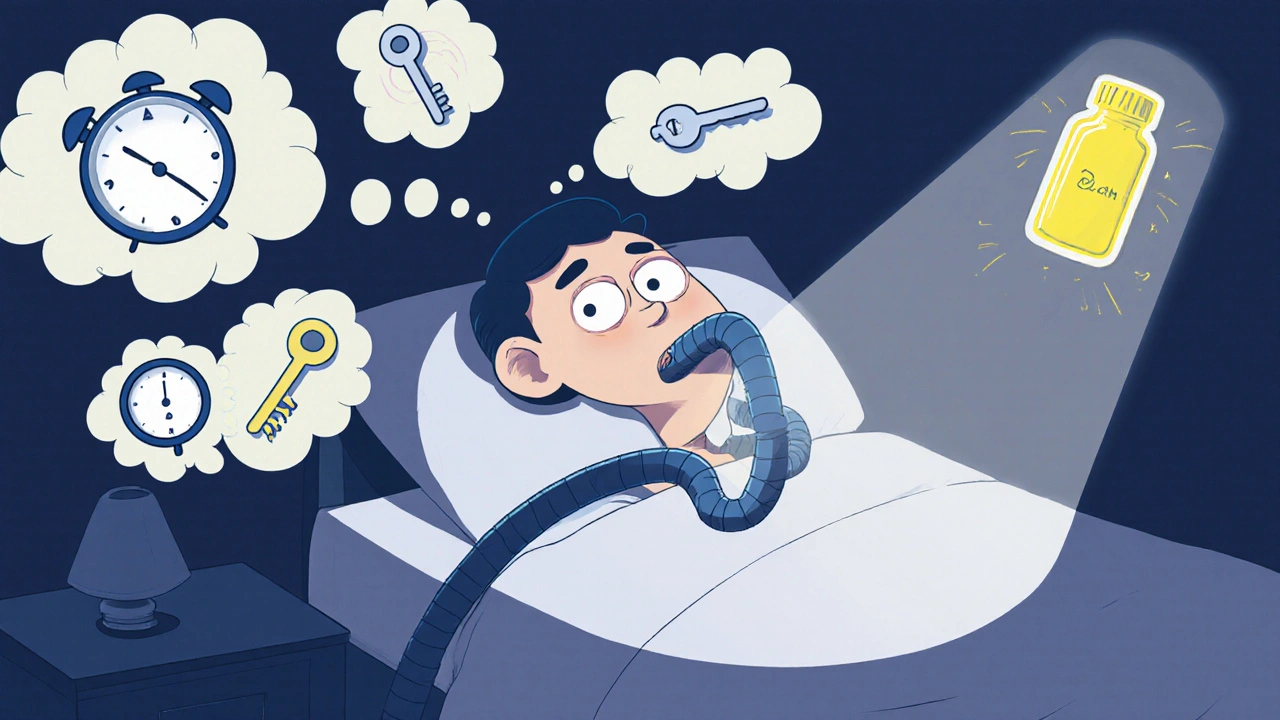When sleeping pills stop working - and start hurting
You’ve tried everything: cutting out caffeine, meditation, white noise machines, even that fancy weighted blanket. Still, you’re lying awake at 2 a.m., heart racing, mind spinning. So you reach for the pill - maybe Ambien, maybe lorazepam - and finally, sleep comes. But the next morning, you feel foggy. Your balance feels off. You can’t remember where you put your keys. And by midday, you’re exhausted again. Sound familiar?
You’re not alone. In 2022, over 6 million Americans were prescribed non-benzodiazepine sleep drugs like zolpidem (Ambien) and eszopiclone (Lunesta). Another 3.8 million got benzodiazepines like temazepam or alprazolam. These drugs work - at first. But for most people, the benefits fade fast, and the risks grow heavier.
The truth? Both benzodiazepines and non-benzodiazepines - often called Z-drugs - are short-term fixes with long-term costs. They don’t cure insomnia. They mask it. And over time, they can make your sleep worse, your memory weaker, and your body more fragile.
How these drugs actually work (and why it matters)
Both classes of drugs boost GABA, the brain’s main calming chemical. But they do it differently.
Benzodiazepines - like diazepam (Valium), lorazepam (Ativan), and temazepam (Restoril) - bind to multiple spots on GABA receptors. That makes them powerful, but messy. They calm anxiety, relax muscles, and knock you out - but they also blunt your reflexes, cloud your thinking, and slow your breathing.
Non-benzodiazepines - zolpidem (Ambien), zaleplon (Sonata), eszopiclone (Lunesta) - were designed to be more precise. They mostly target one receptor subtype (omega-1), meant to help you fall asleep without the heavy sedation. In theory, that sounds better. But in practice? The differences are thinner than the packaging claims.
Both types can cause memory gaps, next-day drowsiness, and even sleepwalking or driving while not fully awake. The FDA got so worried about zolpidem-related sleep-driving incidents that in 2013, they cut the recommended dose for women by half - from 10 mg to 5 mg. Why? Because women metabolize it slower. The drug lingers. And that lingering? It’s what causes accidents.
Half-life: The hidden clock ticking in your body
Not all sleeping pills are created equal - especially when it comes to how long they stay in your system.
Short-acting drugs like zaleplon (Sonata) and triazolam (Halcion) leave your body in a few hours. Good for falling asleep fast. Bad if you wake up at 3 a.m. and can’t get back down - because the drug’s already gone.
Long-acting ones like flurazepam (Dalmane) and diazepam stick around for days. They might help you sleep through the night, but they leave you groggy the next day. Worse, they build up. Take them every night, and by week two, your body is swimming in leftover drug. That’s why older adults are at highest risk: their livers and kidneys can’t clear it as fast. A 2012 JAMA study found benzodiazepines raised hip fracture risk by 2.3 times in seniors. Non-benzodiazepines? Still 1.8 times higher.
And here’s the kicker: even if you take them only a few nights a week, your brain starts to expect them. That’s tolerance. Then dependence. Then withdrawal.

The withdrawal trap: Why quitting feels worse than sleeping
Many people start these drugs thinking, “I’ll just use it for a week.” But insomnia is stubborn. So they keep going. And when they try to stop?
Benzodiazepine withdrawal is brutal. Panic attacks. Tremors. Seizures. Insomnia so bad it feels like your nerves are on fire. One Reddit user who took temazepam for eight months described quitting as “three weeks of pure terror.” That’s not an exaggeration. Withdrawal from long-term benzodiazepine use can be life-threatening without medical supervision.
Non-benzodiazepines? Withdrawal is usually milder - but still real. People report rebound insomnia worse than before they started. Anxiety. Night sweats. Headaches. A 2023 analysis of Reddit’s insomnia community found 68% of users stopped Z-drugs within three months because they stopped working. “Zolpidem stopped helping after two weeks,” wrote one user. “Now I’m back to lying awake - and I’m scared to go off it.”
Neither class is safe for long-term use. The American Academy of Sleep Medicine says two to four weeks is the max. But most people take them for months - or years.
The real danger: Falls, memory loss, and hidden brain damage
It’s not just about sleep. These drugs mess with your brain - and your body - in ways you can’t feel until it’s too late.
The VA’s 2023 warning is blunt: sedative-hypnotics increase your risk of memory and concentration problems by five times. Daytime fatigue? Four times higher. Falls and fractures? Double the risk.
Why? Because they slow down your brain’s ability to process information - even when you’re awake. Your reaction time drops. Your balance wobbles. Your eyes don’t track right. That’s why older adults are told to avoid them entirely. The American Geriatrics Society’s Beers Criteria lists both classes as “potentially inappropriate” for people over 65.
And it’s not just falls. Studies show these drugs worsen sleep apnea - a condition already common in older adults and people with obesity. That means more oxygen drops at night. More strain on the heart. Higher blood pressure. Over time, that can lead to heart attacks or strokes.
Even worse? They don’t improve long-term sleep quality. A 2013 NCBI study followed people using zolpidem for eight weeks. No improvement in energy, mood, or daily function. Just more pills. More fatigue. More risk.
What the data won’t tell you - user experiences
Official guidelines say “use sparingly.” But real people? They’re using them daily.
On forums, common complaints pop up again and again:
- “I took Lunesta and woke up tasting metal for three days.”
- “Ambien gave me burning in my hands. Like needles under my skin.”
- “I had a dream I was at work. Woke up - and was still in bed. No memory of the last two hours.”
- “I stopped taking Ativan cold turkey. Had panic attacks so bad I called 911.”
These aren’t rare side effects. They’re common. A 2021 meta-analysis found 34% of users reported next-day drowsiness severe enough to hurt their job performance. That’s one in three people.
And the interactions? Dangerous. Mixing these pills with alcohol, opioids, or even some antidepressants can slow your breathing to a stop. The FDA has issued black box warnings for this exact reason.

There’s a better way - and it’s not another pill
The truth? There’s no magic pill for chronic insomnia. But there is a proven, safe, lasting solution: cognitive behavioral therapy for insomnia, or CBT-I.
CBT-I doesn’t numb your brain. It rewires it. It teaches you how to break the cycle of anxiety around sleep. It fixes bad habits - like lying in bed awake for hours, or checking the clock at 3 a.m. It helps you associate your bed with sleep, not stress.
Studies show CBT-I works better than pills - and lasts longer. After treatment, people sleep better for years. Not months. Not weeks. Years.
The American Academy of Sleep Medicine now says CBT-I should be the first-line treatment for chronic insomnia. Medications? Only for short-term support - if at all.
And here’s the good news: CBT-I is covered by most insurance plans. You can do it online. In groups. Or one-on-one with a therapist. No pills. No side effects. No risk of falling.
What to do if you’re on these drugs right now
If you’re taking a benzodiazepine or Z-drug, don’t stop cold turkey. That’s dangerous.
Instead:
- Make an appointment with your doctor. Bring this article. Ask: “Is this still right for me?”
- Ask about CBT-I. Request a referral. Most primary care doctors can connect you.
- If you’ve been on it longer than 4 weeks, plan a slow taper. Benzodiazepines need to come down by 10% every 1-2 weeks. Z-drugs can often be reduced faster - but still, don’t rush it.
- Track your sleep. Use a simple journal: time in bed, time asleep, how you felt the next day. Patterns will show you what’s really helping.
- Avoid alcohol. Ever. Even one drink can turn a safe dose into a dangerous one.
It’s hard to let go of something that helps you sleep. But if that help comes with foggy mornings, shaky legs, and fear of withdrawal - it’s not help. It’s a trap.
What’s coming next
Researchers are developing new sleep drugs that don’t touch GABA at all. Suvorexant (Belsomra) and lemborexant (Dayvigo) work by blocking orexin - the brain’s wakefulness signal. Early results show less next-day drowsiness, fewer memory issues, and lower addiction risk.
But they’re still new. And expensive. And not a cure.
The real shift isn’t in the pills. It’s in the mindset. We’ve spent decades treating insomnia like a chemical imbalance. But it’s usually a habit. A thought pattern. A fear.
Fix the habit. Rebuild the sleep drive. That’s how you sleep - without a pill.
Are benzodiazepines safer than non-benzodiazepines for sleep?
Neither is truly safer. Benzodiazepines have a higher risk of dependence and severe withdrawal, while non-benzodiazepines (Z-drugs) are more likely to cause sleepwalking, memory lapses, and next-day impairment. Both increase fall risk, especially in older adults. The FDA and VA now advise both be used only short-term, if at all.
Can I take sleeping pills every night?
No. Both benzodiazepines and non-benzodiazepines lose effectiveness after a few weeks. Long-term use leads to tolerance, dependence, and worse sleep quality. The American Academy of Sleep Medicine recommends no more than 2-4 weeks of use. Chronic insomnia needs behavioral treatment, not nightly pills.
What are the most common side effects of these drugs?
Common side effects include dizziness, drowsiness, dry mouth, headache, and memory problems. Serious side effects include sleepwalking, driving while not fully awake, hallucinations, and next-day impairment that affects work or driving. In older adults, these drugs significantly increase the risk of falls and fractures.
Is it safe to drink alcohol with sleeping pills?
Absolutely not. Alcohol and sleeping pills both depress the central nervous system. Together, they can slow your breathing to dangerous levels - even causing death. This risk is especially high with benzodiazepines and opioids. Even one drink can be enough to trigger a life-threatening reaction.
What’s the best alternative to sleeping pills?
Cognitive Behavioral Therapy for Insomnia (CBT-I) is the gold standard. It’s proven to work better than pills over the long term, with no side effects. It teaches you how to break the cycle of anxiety around sleep, fix poor sleep habits, and retrain your brain to associate bed with rest - not worry. Most insurance plans cover it.
Next steps: If you’re still on these drugs, talk to your doctor about tapering. Ask for a CBT-I referral. Track your sleep for a week. You might be surprised how much better you feel - without a single pill.


Post A Comment